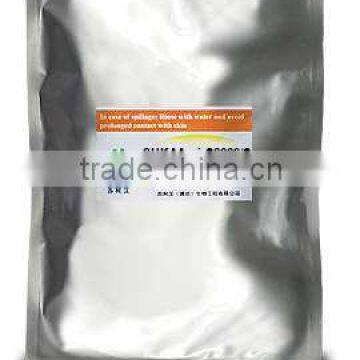Home > Products > Biological Fertilizer > Using plant remains to produce organic fertilizer
Using plant remains to produce organic fertilizer
- 1000 Ton / Tons per Month
- Qingdao
- T/T
You May Like
-
Composting agent for plant remains treatment
-
Composting agent for agricultural materials treatment
-
Composting agent to use agricultural materials make organic fertilizer
-
Composting agent to use plant remains make organic fertilizer
-
Composting convert organic wastes to fertilizer
-
Composting agent for animal manure treatment
Product Details
| Type | Compost | Place of Origin | Shandong, China | |
| State | Powder | Application | fermentation | |
| Brand Name | SUKAHAN | Model Number | SUKAAgri-C3009/C |
Product Description
Composting agent for cellulose/agricultural materials
SUKAAgri-C3009/C is a microbial-based product containing a concentrated blend of non-pathogenic beneficial organisms, multi-enzyme producing microorganisms that is directly added during the composting process. The microorganisms in the product utilize active digestive enzymes to degrade the organic matter and various carbohydrates present in the composting material. The ‘heart solution’ is used to supplement the inherent culture during composting and enhance the decomposition of organic matter for the production of humus compost from cellulosic and agricultural solid wastes.
SUKAAgri-C3009/C contains aerobic micro-organisms with specific biodegradative abilities which are able to grow and degrade organic substances during the composting process. The strain incorporated in SUKAAgri-C3009/C can rapidly degrade the organic materials in industrial, municipal and agricultural materials.
TARGET MECHANISM
Composting is the decomposition of plant remains and other once-living materials to make an earthy, dark, crumbly substance that is excellent for adding to houseplants or enriching garden soil. In nature, organic wastes are broken down through a combination of biological and chemical processes. Biological agents like worms, insects, fungi, bacteria and other micro-organisms "chew up" the materials. Good composting is a matter of providing the proper environmental conditions for microbial life. Compost is made by billions of microbes (fungi, bacteria, etc.) that digest the agricultural, industrial and municipal wastes that are provided. All of these will slowly make compost out of the different wastes under any conditions. The products of digestion are further transformed by oxidation (exposure to air), reduction and hydrolysis (exposure to water).
In tropical and subtropical climates, which are warm so much of the year, composting rarely utilize the psychrophiles (low temperature bacteria). Most composting processes are started by mesophiles (medium temperature loving organisms) at mesophilic temperatures, the thermophiles (high temperature loving organisms) increase the temperature of the compost file into the thermophilic range. Microbes in the pile create considerable heat during the decomposition process and essentially "cook" the compost. Temperatures between 90 and 140 degrees Fahrenheit are common in properly maintained compost piles. These high temperatures are necessary for rapid composting as well as for destroying weed seeds, insect larvae, and potentially harmful bacteria and disease causing organisms that could be detrimental to the plants.
Supplementation of the indigenous composting population with scientifically blended concentrations of selected, adapted, cultured and improved bacterial and fungal strains will increase the decomposition time and efficiency. These cultures are selected for better survival, faster exponential increase in population, enzyme production and organic waste degradation that will enhance the decomposting process of organic matter in compost production.
The standard concept for the decomposting of lignocellulosic biomass starts with opening the fiber structure to make the sugar fractions available for metabolic action by different organisms. Microbes utilize enzymes like cellulase, xylanase, a-amylase, lignin–degrading enzymes to release sugars from cellulose, hemicellulose, starch and other carbohydrates in the compost pile. Enhanced growth of desired microbial cultures in the composting heap will prevent the increase of undesirable microorganisms and vertebrates that produce undesirable odor, appearance and potentially pathogenic characteristics.
BENEFITS
l reduces the organic waste material destined for landfills
l provides a useful way of reclaiming nutrients from organic refuse
l one of nature's best mulches and soil amendments
l supplement for commercial fertilizers
l compost is cheap
l compost improves soil structure, texture, and aeration and increases the soil's water-holding capacity
l compost loosens clay soils and helps sandy soils retain water
l compost addition improves soil fertility and stimulates healthy root development in plants
l the organic matter in compost provides food for microorganisms, which keeps the soil in a healthy, balanced condition
l nitrogen, potassium, and phosphorus will be produced naturally by the feeding of microorganisms, so few soil amendments will need to be added
l saves valuable landfill space and possible contamination of land and water due to landfill 'leachate'
l can be used as fertiliser on farmland or in the garden
BENEFICIAL MICROOGANISMS FOR COMPOSTING
l The composting process uses beneficial microorganisms and higher animal life to decompose organic matter in industrial, municipal and agricultural materials.
l The organic portion of solid waste can also be biologically degraded by composting, the process by which organic solid waste of mixed composition is digested by aerobic (air loving), mesophilic (medium-temperature requiring) and thermophilic (high-temperature requiring) microorganisms.
l Composting is a microbial process that converts organic waste material into a stable, sanitary, humus-like product that can be used for the improvement of soil composition.
l Supplementation of the inherent microbial populations with high concentrations of selected, adapted, cultured and improved microbial strains with better survival ability, faster increase in bacterial population, high enzyme production will enhance the decomposition of organic matter.
l Effective combination of beneficial microorganisms will result to a reduction in composting time.
INSTRUCTIONS
Bacterial Count: 1.0 x 109 CFU/gram
Appearance:
Powder: black powder
Odor: Slight fermentation odor
Effective pH range: 6.5 - 8.0
DOSAGE:
0.25‰-0.5‰ inclusion
250g-500g product per ton composting material
APPLICATION GUIDE:
l Weigh 250g of the product and add to 1 ton of the composting material.
l Mix well using a suitable mixing equipment and compost for 15 days.
l SUKAAgri-C3009/C is packaged as 1 kg/ba,20 kg per box.
l Alternative packaging is available upon request for smaller or larger volumes.
TECHNICAL SERVICE
Shandong Sukahan Bio-technology Co., Ltd. is always ready to provide help for using our product properly.
Contact Us

- Shandong Sukahan Bio-technology Co., Ltd.
- Contact nameLinda Han Chat Now
- Phone86-536-2225033
- AddressNo.2237, East Wolong Street, High &New Technology Industrial District, Weifang, Shandong, P.R. China, Weifang, Shandong
Product Categories
New Products
-
Composting agent using animal manure to make organic fertilizer
-
Composting agent for horse ranch to use horse manure make organic fertilizer
-
Composting agent for piggery to use manure to make organic fertilizer
-
Composting agent for sheep farm to use manure make organic fertilizer
-
Composting agent for cattle farm to use manure make organic fertilizer
-
Composting agent for chicken farm to make organic fertilizer
-
Composting product using cow chicken manure to make organic fertilizer
-
Composting agent for protein-based materials
-
Cellulose/Agricultural materials composting agent
-
SUKAST bacteria for septic tank
-
bacteria for septic tanks SUKACLEAN S/T
-
septic tank and drain cleaning bacteria and enzyme SUKACLEAN S/T
-
biological drain cleaner SUKACLEAN ST Septic Tank Deodorizer
-
SUKAST biological bacteria in latrine and septic tank to clean the waste
-
SUKAST biological washroons toilet drain cleaner
-
septic tank deodorizer enzyme SUKAST biological Enzyme of Septic tank
-
toilet treatment SUKAClean S/T bacteria for pit latrine
-
bacteria for septic tank SUKAST bacteria para fossa septica
-
septic tank enzymes SUKAST Biological septic tank deodorizer
-
septic tank additive SUKAST bio additives for Septic Tank Treatment
-
effective microorganisms for septic tank SUKAST Biological Septic Tank Treatment
-
bacteria for septic tank decontamination SUKAClean S/T septic tank smell control bacteria
-
urine enzyme cleaner SUKAST Septic Tank Deodorization and Decontamination
-
SUKAST bacteria for waste treatment in septic tank
Popular Searches
- amino acid
- Anthuriums
- coo
- amino acid fertilizer
- organic fertilizer
- humic acid
- seaweed extract
- nutrient
- potassium humate
- humate
- Amino Acid Powder Fertilizer
- Liquid Fertilizer
- humic
- Seaweed Fertilizer
- Seaweed Extract Fertilizer
- Tea Seed Meal
- organic manure
- soil conditioner
- improve soil
- manure
- laminaria japonica
- Fulvic Acid
- Plant Source Amino Acid
- humic acid powder
- leonardite
- Humic Acid Fertilizer
- Potassium Humate Organic Fertilizer
- Organic Potassium Humate
- Other Fertilizer
- fulvic
Recommended Products
- Amino Acid Powder 90% Yellow Powder Total Nitrogen 13% Free Amino Acid 30% Agriculture Raw Material
- Amino Acid Powder (NPK 16-0-0)
- Amino Acid Powder (NPK 14-0-0)
- Corn Steep liquor For fertilizer (Solids Content 60%) 100% water-soluble
- High Nitrogen Organic Fertilizer With Pure Amino Acid Powder 16-0-0 For Tomato Crops
- Calcium Magnesium Amino Acid Powder 80% Yellow Powder
- NO Salt Chlorice free Micronutrients Amino Acid Chelate Organic Fertilizer
- transparent yellow liquid amino acid foliar fertilizer 300g/L low chlorine material for fertilizers blending
- Enzymatic Fish Amino Acid 80% Organic Nitrogen Fertilizer 15-1-1
- Shihong Plant Stimulant Raw Material 40%-80% Organic Water Soluble Amino Acid Powder Fertilizer
- Plant Nutrition Enzymatic Amino Acid 80% Powder Organic Nitrogen 16-0-0
- Soybean Meal Amino Acid Liquid 45% Organic Fertilizer Mirconutrients Compound Amino Acid
Find Similar Products By Category
- Agriculture & Food > Agriculture Manure > Organic Fertilizer
- Please Enter your Email Address
- Please enter the content for your inquiry.
We will find the most reliable suppliers for you according to your description.
Send Now-
 Linda Han
Hi there! Welcome to my shop. Let me know if you have any questions.
Linda Han
Hi there! Welcome to my shop. Let me know if you have any questions.
Your message has exceeded the limit.

- Contact supplier for lowest price
- Customized Request
- Request Sample
- Request Free Catalogs
Your message has exceeded the limit.
-
Purchase Quantity
-
*Sourcing Details
Your inquiry content must be between 10 to 5000 characters.
-
*Email
Please enter Your valid email address.
-
Mobile





